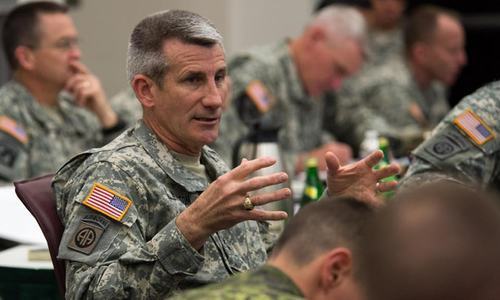WASHINGTON: Last year, Pakistan took some concrete steps in the war against terrorism but its actions also pushed a large number of extremists into Afghanistan, says the outgoing US commander for Afghanistan.
“Pakistan has done a lot of stuff in the last year. It’s very courageous of Gen Raheel Sharif, the Chief of Pakistani Army, to have Pakistani military operations,” Gen John Campbell told the House Armed Services Committee.
“But the result of that has driven a lot of that into Afghanistan and the Afghan forces have had to deal with that as well,” he added.
A transcript, released here, shows a candid discussion between the general and the lawmakers on Pakistan’s role in the Afghan war and how he thinks Pakistan can help restore peace in its neighbourhood.
During the debate, a lawmaker, Congressman Dough Lamborn, asked the general if he was satisfied with the current rules of engagement and hot pursuit into Pakistan.
“Would you like more flexibility when it comes to pursuing people who have committed terrorist or other violent acts and are melting back into Pakistan, to be able to strike them even if they’re right at the border,” the congressman asked.
“Sir, as a matter of course operational security reasons we don’t talk about rules of engagement in an open forum,” the general replied. “We have commitment, we’re going to work on the security, help build their security,” he said, explaining that a better option than sending troops into Pakistan on hot pursuits would be to train Afghan security forces to fight terrorists.
But the general also said that with the Taliban hedging their bets on the planned withdrawal of American troops from Afghanistan, a better option would be to announce a long-term US commitment to Afghanistan.
“It sends a message to Pakistan, it sends a message to Taliban, and it sends a message to Nato,” he said.
Gen Campbell, who completes his 18-month deployment in Afghanistan this month, said plans to reduce the current US presence from 9,800 to 5,500 troops would also drastically reduce their capacity to support Afghan forces.
“If we talk in terms of a long-term commitment, it does a couple things. It gives confidence to the Afghan government, to the National Unity government, to the Afghan people, to the Afghan Security Forces,” he said.
But doing otherwise, he warned, would allow the enemy to simply “wait us out”.
“So again, long-term commitment… is the way we need to move forward to enable the Afghans to have a predictability and stability,” he said.
“A lot of reason you see a lot of the refugees leaving out of Afghanistan this year is because of that instability.”
Responding to a question on safe havens, he noted that such hideouts exited on both sides of the border.
“Pakistan and Afghanistan have got to work together. They’ve got to talk military-to-military on how they can get after a common enemy that knows no border, knows no boundaries,” he said.
Gen Campbell said he was emphasising the need for improving coordination between the two militaries because Pakistan and Afghanistan had “a lot of ungoverned space”.
“This is going to be a problem for years and years and years… The one way that we can get after it is to continue to build upon the capability of the Afghan forces to fight this enemy,” he said.
Published in Dawn, February 8th, 2016












































